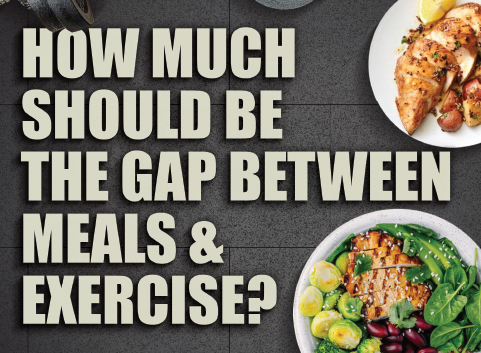How Much Should Be The Gap Between Meals & Exercise

By Akshay Chopra
A common doubt, I often get, and quite a consistent one is: “How much gap should be there, between meals and workout ?
Well, I couldn’t find many research studies on this topic, but there are some common-sense understandings and some scientific basis to answer this question.

Proper nutrition is extremely important to fuel your workout and optimal recovery post workout. The question here is not about nutrient timing or what to eat before workout, but how much gap should be there between meals and exercising. But a lot depends on the time of the day you are working out.
1. Working out early morning - if you like to workout first thing in the morning, then probably you won’t be eating a full-fledged meal, unless you are working night shifts and coming straight from the office. I have already shown in my videos and articles that empty stomach workout is detrimental to the workout, specially of you’re doing a high intensity workout or resistance training workout. So, having a normal fruit or a light carbohydrate snack, and a black coffee, or your pre-workout drink 30min prior to the workout would be good enough to sustain the workout.
Because the timing is limited, as you need proper sleep also, so you cannot afford to have a full-fledged meal, before a workout, early morning.
2. Working out anytime in the day - Evening let’s say. Now, if you have had a proper lunch, for e.g. a good Indian meal consisting of roti or rice, pulses, vegetables, salads etc. then you will need a much longer time to digest the meal, enough to exercise at a higher intensity. Such a meal will also give you an excellent workout, as your body will have ample nutrients in terms of carbs and proteins.
But, because it’s a heavier lunch, you will need at least 2hrs before you choose to engage in a heavy workout. That depends on the size of the lunch you consumed. When you eat a meal, the blood in the body is diverted from the less important functions to digest the food in the stomach. If you do not give ample time for digestion to take place, and start doing intensive physical work, then the limited blood the body have, will now be diverted to the working muscles, and inadequate blood will be there both for muscle recovery and digestion. This generally leads to nausea, stomach pain, vomiting, acid reflux, heart burn etc.
3. What & how much you eat also matter - Complex carbs with proteins and fats will take time to digest. That’s why a bigger meal should be consumed at least 2-3hrs before an intense workout session. Some people have an excellent digestive capacity, and can even exercise on a full stomach. But, that’s not the norm.
However, as I have told in my earlier videos and articles too, it is always better to workout post a meal, whether big or small. A 2011 study in the Canadian Journal of Behavioral Science, by Jennifer Coelho & team, investigated the nature of the timing of exercise relative to an eating opportunity. Researchers took female undergraduate students and divided them into three groups: exercise before eating, exercise after eating, or no exercise.
Researchers saw that, participants who exercised after eating had higher expectations of the effectiveness of the exercise than those who exercised before eating, while those who exercised before eating reported valuing dieting more than controls.
So, the timings I mentioned above are general and average recommendations. No one can give you the exact numbers in this regard, except yourself. You need to listen to and understand your body. If you think, you need more time to digest a meal, then take more time. Don’t go on some pre-mentioned number, and blame yourself, for not fitting into the norm. In real world, there is no norm or average, it’s always according to an individual.
